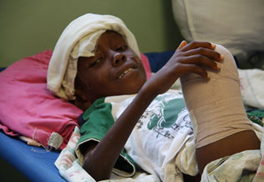With Haiti’s healthcare services in worse shape than before the earthquake, ACT Alliance members in Port-au-Prince continue to support medical care for Haiti’s most vulnerable.
ACT is a global alliance of churches and faith-based groups — including the Presbyterian Church (U.S.A.) through Presbyterian Disaster Assistance — drawn from the membership of the World Council of Churches and the Lutheran World Federation. It is based in Geneva, Switzerland.
As it had done long before the Jan. 12 temblor, ACT is caring for the children. Traumatized, ill and suffering loss of limbs, hundreds of children need round-the-clock care.
At Port-au-Prince’s Aprosifa malnutrition clinic, which is supported by ACT, staff feed 15-20 children and their mothers every day. The dedication of Antonine St. Quitte Dimanche, who has worked at the clinic 12 years, has not diminished since the earthquake.
She continues to make sure the children get enriched milk, spinach, beans and rice every day. The most severely malnourished are given plumpy nuts, a specially formulated paste full of essential vitamins and minerals.
But she fears for the future of these children. “There are so many children now without parents and those whose parents survived now have no means of earning a living.”
Dorotie Pierre still brings her nine-month-old son Thierry to the clinic every day, despite being reduced to sleeping on old blankets outdoors after losing everything. Thierry’s father was killed in the earthquake, making life for the family even tougher. “If the rains come, I don’t know what I will do,” Dorotie said.
Elsewhere in Port-au-Prince, another children’s malnutrition hospital is being kept open with ACT support. But now it is running as an emergency clinic as injured men, women and children arrive daily. The clinic has 100 beds but 140 patients. ACT has supplied two large tents for those recovering from surgery.
One of the younger patients, six-year-old Kevine Scemoaes is about to have surgery on a badly injured foot. He has a high temperature but is in a good mood as he tells his story. Walking through the streets of Haiti, the earthquake toppled a wall, burying him. He wriggled free but found he couldn’t walk because of his injured leg. Kevine crawled to the middle of the street and cried for help until he was brought to the hospital.
In Kevine’s ward, five-year-old Melunda Bregar suffers severe head and back injuries. On top of that, she says nothing. Shock has left her unable to speak. Her mother sits beside her praying, a copy of the New Testament with her.
The level of treatment at the hospital is high, even as surgery goes on around the clock. Most of the surgeons are Italian or American. Most cases are bone fractures, and able to be treated. The hospital is treating around 40 cases of complex fractures of the upper leg.
And a lot of amputations. Rezil Fabila is in pain, having lost her right leg, as did Franck Mickelsen. Despite his difficult situation he smiles at visitors. A young boy who lost both arms walks around with his mother for the first time since surgery. The atmosphere in the clinic is relaxed but staff say they are depressed when they see children with amputated limbs.
The good news that people are still able to access healthcare comes as the Haitian government says it will need international support for at least five to 10 years to help recover from this month’s devastating earthquake.
Reuters reports that donors have decided to hold an urgent international pledging conference at the U.N. headquarters in New York in March. Meanwhile, authorities are trying to relocate at least 400,000 survivors in temporary tent villages outside the wrecked capital Port-au-Prince.

